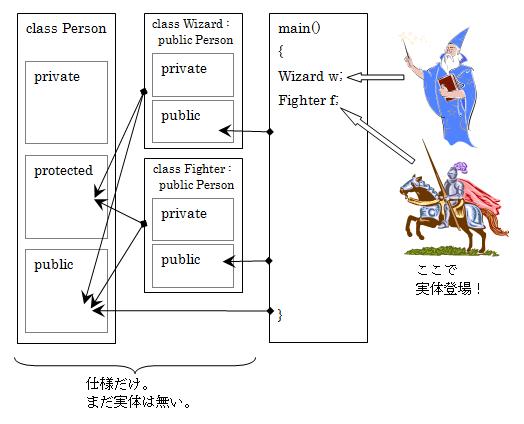キーワード辞典
かなり乱暴なクラスの話(2)
登録日 13/06/01 更新日 13/06/04
この辺って、 言語処理系によってもかなり違って来るので、 物凄くざっくりと。
クラスの継承
クラスでは、コードの再利用が出来る。 これを継承と呼ぶ。 例えば、 ロールプレイングゲームのキャラクターで、 全ての登場人物に共通な部分を作っておき、 それを継承して、別途、戦士や魔法使いといった特殊能力の部分を追加する、 といった事が出来る。
C++による、ロールプレイングゲーム風のサンプル例。
サイコロを振る方式に変えました。
時間も無くて、我ながら手抜きだ、というのは、自覚しております。
雰囲気だけです。実行時のエラー処理をしていないので要注意です。
敢えてインラインで書いているので
コンパイルすると警告が出ることがあります。
 基本となるPersonクラスを基底にして、
魔法使いのWizardクラスと戦士のFighterクラスを派生させています。
Personクラスでは、基本となるパラメタと行動を、
WizardとFighterの各クラスでは、
各々に特有のパラメタと行動を指定しています。
基底クラスでメンバをprotectedにすると、
派生クラスから以外のアクセスが出来なくなります。
基本となるPersonクラスを基底にして、
魔法使いのWizardクラスと戦士のFighterクラスを派生させています。
Personクラスでは、基本となるパラメタと行動を、
WizardとFighterの各クラスでは、
各々に特有のパラメタと行動を指定しています。
基底クラスでメンバをprotectedにすると、
派生クラスから以外のアクセスが出来なくなります。
面倒臭いので、していませんが、パラメタを増やしたり、
経験値によってパラメタを変化させたりも、出来ます。
右の図では、説明を単純にする為に
main()の中で魔法使いと戦士を一人ずつ登場させていますが、
下のプログラムではmain()の外で配列で登場させています。
また、黒い矢印は、アクセスが可能かどうかをあらわしています。
// RynRPG2a.cpp 2013.06.03
#include <iostream>
#include <iomanip>
using namespace std;
class Person{ // 基底クラス Person
protected:
char name[10]; // 名前
int life; // ライフポイント
int gold; // ゴールド
void kihon_init(int i){
cout << i+1 << "人目の名前(10文字以内) ";
fflush(stdin);
fgets(name, sizeof(name), stdin);
name[strlen(name) - 1] = '\0';
life = 200;
gold = 200;
}
void kihon_disp(){
cout << setw(10) << name << "さん";
cout << " life = " << setw(4) << life;
cout << " gold = " << setw(4) << gold;
}
public:
void takarakuji(){
int flg;
flg = rand() % 5;
if(flg == 0){
cout <<"1等! 100gold" << endl;
gold += 90;
}else if(flg == 1){
cout << "2等 50gold" << endl;
gold += 40;
}else{
cout << "はずれ!" << endl;
gold -= 10;
}
}
void name_disp(int i){
cout << i+1 << ":" << name << " ";
}
};
class Wizard : public Person{ // 派生クラス 魔法使い
private:
int maryoku; // 魔力
public:
void tatakau(){
int flg = rand() % 2;
int flg2 = (rand() % maryoku) + 10;
cout << name << "「わしの術を受けてみよ!」" << endl;
if(flg !=0){
cout << name << "さんの勝ち! ";
cout << flg2 << "goldを手に入れた!" << endl;
gold += flg2;
maryoku += 10;
}else{
cout << name << "さんの負け! ";
cout << flg2 << "のlifeとgoldのダメージ" << endl;
gold -= flg2;
life -= flg2;
}
}
void hataraku(){
cout << "わしは魔法使い。いやじゃ" << endl;
}
void init(int i){
kihon_init(i);
maryoku = 10;
}
void disp(){
kihon_disp();
cout << " maryoku = " << setw(4) << maryoku << endl;
}
};
class Fighter : public Person{ // 派生クラス 戦士
private:
int buryoku; // 武力
public:
void tatakau(){
int flg, flg2;
flg = rand() % 2;
flg2 = (rand() % 10) * buryoku + 10;
cout << name << "「俺の剣を受けてみよ!」" << endl;
if(flg !=0){
cout << name << "さんの勝ち! ";
cout << flg2 << "goldを手に入れた!" << endl;
gold += flg2;
buryoku++;
}else{
cout << name << "さんの負け! ";
cout << flg2 << "のlifeとgoldのダメージ" << endl;
gold -= flg2;
life -= flg2;
}
}
void hataraku(){
int flg;
flg = (rand() % 10) * 10 + 10;
cout << name << "さんが" << flg << "goldを手に入れた!" << endl;
gold += flg;
}
void init(int i){
kihon_init(i);
buryoku = 0;
}
void disp(){
kihon_disp();
cout << " buryoku = " << setw(4) << buryoku << endl;
}
};
#define WNINZU 1 // 魔法使いの人数
#define FNINZU 2 // 戦士の人数
#define NINZU WNINZU + FNINZU
int saikoro();
int jinsen();
Wizard w[WNINZU];
Fighter f[FNINZU];
int main()
{
int i=1;
int j;
cout << "Wizards" << endl;
for(j = 0; j < WNINZU; j++)
w[j].init(j);
cout << "Fighters" << endl;
for(j = 0; j < FNINZU; j++)
f[j].init(j);
while((i > 0)&&(i < (NINZU + 1))){
for(j = 0; j < WNINZU; j++){
cout << "Wizard ";
w[j].disp();
}
for(j = 0; j < FNINZU; j++){
cout << "Fighter ";
f[j].disp();
}
i = saikoro();
}
}
int saikoro()
{
int me, i, j;
me = rand() % 4;
if(me < 2){
cout << endl << "敵があらわれた!" << endl;
i = jinsen();
if((i > 0) && (i < (WNINZU + 1)))
w[i-1].tatakau();
else if((i > WNINZU) && (i < (NINZU + 1)))
f[i-WNINZU-1].tatakau();
}else if(me == 2){
cout << endl << "バイト先を見つけた!" << endl;
i = jinsen();
if((i > 0) && (i < (WNINZU + 1)))
w[i-1].hataraku();
else if((i > WNINZU) && (i < (NINZU + 1)))
f[i-WNINZU-1].hataraku();
}else if(me == 3){
cout << endl << "宝くじを10goldで買うことにした!" << endl;
i = jinsen();
if((i > 0) && (i < (WNINZU + 1)))
w[i-1].takarakuji();
else if((i > WNINZU) && (i < (NINZU + 1)))
f[i-WNINZU-1].takarakuji();
}
return i;
}
int jinsen()
{
int i,j;
cout << "誰が? (";
for(j = 0; j < WNINZU; j++)
w[j].name_disp(j);
for(j = 0; j < FNINZU; j++)
f[j].name_disp(WNINZU + j);
cout << ")";
cin >> i;
return i;
}
![[ 黒板消しとチョーク受けの画像 ]](../Gif/BlackBoardEnd.gif)
![[ 赤い玉の画像 ]](../Gif/RedBall.gif)